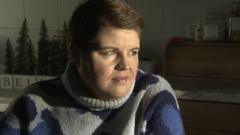Voters like Margarite express feeling "gaslighted" by persistent narratives of national wealth that seem irrelevant to local realities, reinforcing collective frustrations in areas like Donegal, where urgent infrastructure and healthcare improvements are sorely needed. In sum, the general election on Friday promises to capture the voice of a candid electorate eager for meaningful change amid pressing challenges.
Ireland’s Sunday election period promises pivotal implications for healthcare, housing, and immigration policies amidst voter frustrations.
In what is anticipated to be a significant electoral event, the Republic of Ireland prepares for its general election where voters are expressing growing dissatisfaction regarding stark contrasts between the country's economic performance and their everyday realities. Emma, a mother of four with concerns about medical access for her children, voiced her sentiment, stating, "I hear we are one of the richest countries in the world, but I don't see it." The closing days of the campaign have been marked by frustrations concerning healthcare access, with many families like Emma's facing long waiting periods to secure necessary services.
Despite an impressive budget surplus of €25 billion, fueled largely by significant corporate tax revenues, Ireland is grappling with pressing issues such as housing shortages, rising living costs, and the ongoing challenges posed by immigration. Local journalist Áine Ní Bhreisleáin pointed out the invaluable local perspective, stating that citizens are cynically aware that despite political assurances, essential services are lagging.
In Donegal, where the gap between urban wealth and rural needs is most keenly felt, many residents feel isolated and neglected by policymakers. Radio host Greg Hughes noted sentiments of disconnection among constituents as they grapple with the unmet expectations following promises of improvement. Margarite, another local, articulated the disconnect saying the narrative of national prosperity feels misleading when juxtaposed with daily struggles around public services.
As the election approaches, the collective discontent of voters suggests a significant opportunity for change in Ireland's political framework, potentially heralding a shift in focus towards more localized issues. The incumbent coalition led by Fine Gael, Fianna Fáil, and the Green Party is joined by an increasing number of independent candidates also seeking reform, while Sinn Féin aims for a momentous lead in the polls, embodying the desire for change that resonates with voters.
Ireland’s Sunday election period promises pivotal implications for healthcare, housing, and immigration policies amidst voter frustrations.
In what is anticipated to be a significant electoral event, the Republic of Ireland prepares for its general election where voters are expressing growing dissatisfaction regarding stark contrasts between the country's economic performance and their everyday realities. Emma, a mother of four with concerns about medical access for her children, voiced her sentiment, stating, "I hear we are one of the richest countries in the world, but I don't see it." The closing days of the campaign have been marked by frustrations concerning healthcare access, with many families like Emma's facing long waiting periods to secure necessary services.
Despite an impressive budget surplus of €25 billion, fueled largely by significant corporate tax revenues, Ireland is grappling with pressing issues such as housing shortages, rising living costs, and the ongoing challenges posed by immigration. Local journalist Áine Ní Bhreisleáin pointed out the invaluable local perspective, stating that citizens are cynically aware that despite political assurances, essential services are lagging.
In Donegal, where the gap between urban wealth and rural needs is most keenly felt, many residents feel isolated and neglected by policymakers. Radio host Greg Hughes noted sentiments of disconnection among constituents as they grapple with the unmet expectations following promises of improvement. Margarite, another local, articulated the disconnect saying the narrative of national prosperity feels misleading when juxtaposed with daily struggles around public services.
As the election approaches, the collective discontent of voters suggests a significant opportunity for change in Ireland's political framework, potentially heralding a shift in focus towards more localized issues. The incumbent coalition led by Fine Gael, Fianna Fáil, and the Green Party is joined by an increasing number of independent candidates also seeking reform, while Sinn Féin aims for a momentous lead in the polls, embodying the desire for change that resonates with voters.



















